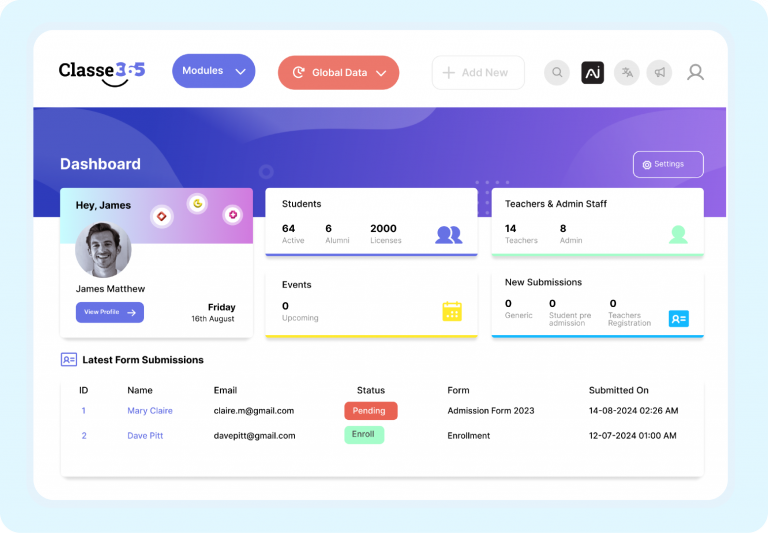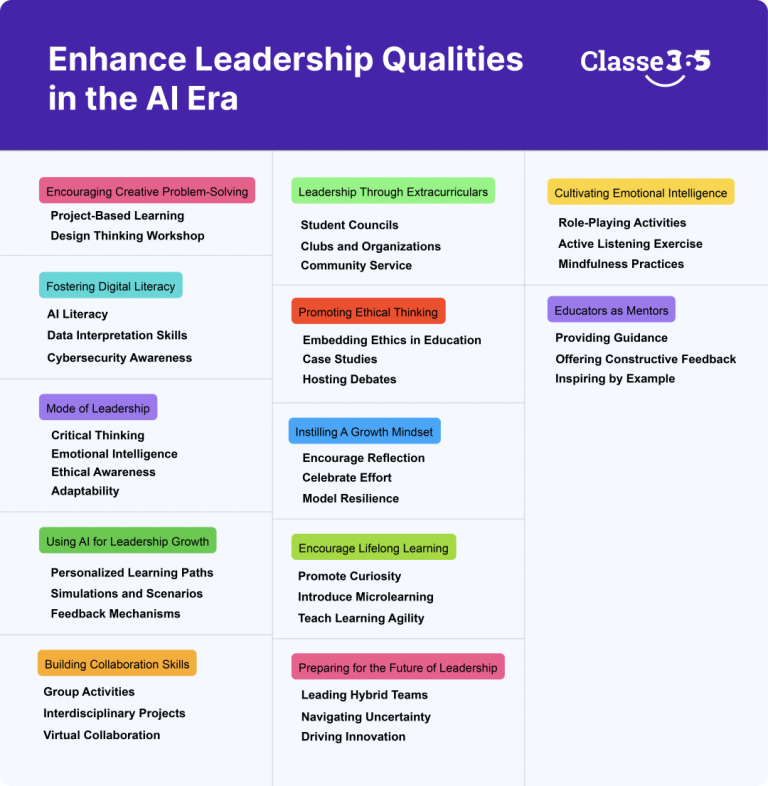The buzz around AI is so much that people have started believing AI will take over human intelligence in the education sector. Industry experts have asked us to hold the pressure back. AI, certainly, has so much to offer. But, it is not taking the place of human intelligence soon enough especially if we learn to live with it.
There are five kinds of human intelligence that AI has still not been able to replicate:
- Emotional Intelligence
- Creativity
- Critical Thinking
- Intuitive abilities
- Culturally sensitive abilities
Human leadership qualities are profoundly based on these five kinds of intelligence.
AI is a machine learning technology and just like any other technology, it focuses on turning our manual tasks into automated ones. In 2025, concentrate on how you can prepare your students to be AI-ready. So they can lead their way by using AI as an assisting technology.
Enhance Leadership Qualities in the AI Era
Mode of Leadership in the Age of AI
The age-old belief that ‘leaders are born and not made’ has taken a backfoot as soon as AI has dropped in. People in the education industry have started moving flexibly around the concept that ‘collaboration, innovation, and ethical thinking are the foundations of leadership.’ The AI era demands leaders who are not only technologically adept but also capable of understanding and addressing societal as well as ethical implications of technology.
No matter what stream the students choose. If you want to see a leader in your students and rank your institution based on that, teachers must encourage students to develop:
- Critical Thinking: Not trusting AI blindly but rather critically analyzing data and information provided by AI tools.
- Emotional Intelligence: Leading a team with empathy and fostering a culture of building meaningful connections among the team members.
- Ethical Awareness: Thinking critically about the effect of AI-driven decisions.
- Adaptability: No matter how challenging, thriving in dynamic and uncertain scenarios.
Encouraging Creative Problem-Solving
AI tools work to suggest ideas efficiently. However, it lacks a creative aspect that is exclusive to human qualities. So, teachers must encourage students to develop creative problem-solving skills through:
- Project-Based Learning: Teachers need to implement innovative teaching methods like a project or problem-based learning where students will deal with real-world problems. Thus, they can develop creative solutions and will not depend on AI. Encourage them to research using AI tools but influence them to show originality in problem-solving approaches. Here are some unique teaching methods for teachers to use in the age of AI.
- Design Thinking Workshop: Children need your assistance in building something new. Arrange workshops for them to empathize, define problems, ideate, prototype, and test their solutions, blending human creativity with AI insights.
For instance, ask for their suggestions on addressing the climate change crisis where they can analyze data patterns through AI and build actionable strategies.
Promoting Ethical Thinking
AI was launched with no proper user guidelines. Just like social media, is it turning into another tool that spreads unchecked information? Well, the ethical use of AI is nowadays the biggest concern for everyone, especially for the educators. The widespread use of AI creates data privacy and algorithmic bias concerns besides ethical concerns.
The future leaders must know how to grapple with these issues responsibly. Educators have to shoulder the responsibility in the first place and foster ethical thinking by:
- Incorporating Ethics into the Curriculum: Ethical use of AI is a practice. The basis of it stands on fairness, accountability, and transparency. Here is an entire guideline on how you can implement ethical AI in your institution.
- Hosting Debates: Engage students in debates and discussions on the moral implications of AI such as the use of facial recognition or AI in hiring practices. The more children will voice their opinion, the more authority and confidence they will develop.
- Case Studies: Give them exposure to real-world scenarios where AI decisions led to controversy. Encourage them to draw lessons analyzing the situation and point out the areas for improvement.
Building Collaboration Skills
Leadership’s foundation stands on collaboration. This AI-driven world doesn’t call for competition, but rather collaboration. In this age, leaders need to work seamlessly with diverse teams, including human and AI collaborators. Teachers can build the foundation of a collaborative approach in students with:
- Group Activities: Encourage students for teamwork to finish their assignments. Set a rule that everyone must use AI tools to achieve a common goal.
- Interdisciplinary Projects: Show the young minds how everything is connected and only then they will be interested in learning interrelated subjects. Merge fields like technology, arts, and social sciences to help students appreciate diverse perspectives.
- Virtual Collaboration: Utilize AI-powered platforms for remote collaboration, preparing students for global teamwork in the digital age.
Cultivating Emotional Intelligence
Emotional intelligence is at the core of human intelligence. Enhance skills like empathy, communication, and conflict resolution in students to help them develop leadership qualities. Teachers can engage them in:
- Role-Playing Activities: Teachers can create leadership scenarios where students navigate interpersonal dynamics.
- Active Listening Exercise: Who is not a good listener is not a good speaker and who is not a good speaker is not a good leader. Leaders must speak to motivate and drive the change. Therefore, conduct active listening exercises where students understand others’ perspectives and empathize with them.
- Mindfulness Practices: Incorporate mindfulness sessions to help students manage stress and build self-awareness, a key component of emotional intelligence.
Encourage Lifelong Learning
AI is there to help us not to turn us into lazy machines. Therefore, future leaders must know that AI can be used in research not in decision-making. A leadership role needs adaptability and a commitment to lifelong learning. Teachers can instill this mindset with:
- Promote Curiosity: Reward students for asking questions and exploring new ideas.
- Introduce Microlearning: Use AI platforms to offer bite-sized learning opportunities tailored to students’ interests and needs.
- Teach Learning Agility: Highlight the importance of learning, unlearning, and relearning to stay relevant in a fast-changing world.
Leveraging AI Tools for Leadership Development
In the age of AI, leaders cannot dodge its benefits. AI is here to help us. If we do not already start using the technology, we’ll lag. So, the teachers must teach their students how they can leverage AI for a smoother and seamless workflow.
- Personalized Learning Paths: AI can analyze students’ strengths and weaknesses, suggesting tailored activities to enhance their leadership potential.
- Simulations and Scenarios: Use AI-powered virtual reality to immerse students in leadership challenges, such as managing a team or resolving a crisis.
- Feedback Mechanisms: AI can provide instant feedback on assignments, communication styles, or decision-making, enabling continuous improvement.
For example, AI-driven platforms like Classe365 make learning interactive while emphasizing leadership lessons. The teachers can identify the student’s strengths and weaknesses through simple AI prompts. Start your free trial of the platform now.

Fostering Digital Literacy
Leaders can never navigate the team without a proper understanding of a tool. Students must develop this idea that AI is just another technology and no magic. Teachers can do this through:
- AI Literacy: Developing AI literacy helps students understand A-Z of the technology. They start perceiving where and how much AI will help them.
- Data Interpretation Skills: Help students analyze and derive meaningful insights from data. At the same time, helps students become independent analysts instead of solely believing in AI.
- Cybersecurity Awareness: Highlight the importance of securing digital systems and personal data.
Refer to the previous guide on implementing the ethical use of AI in your institution.
Instilling A Growth Mindset
Embracing change and advancing with new technology reflects a growth mindset. This mindset helps students see failures as opportunities to learn and grow.
- Encourage Reflection: Self-reflection is the foundation of leadership. Leaders must embrace their team’s strengths and weaknesses.
- Celebrate Effort: Recognize their effort in a job irrespective of their outcomes.
- Model Resilience: Share examples of leaders who overcame setbacks to achieve success. Stories like this will help them connect and relate.
Integrate Leadership into Extracurricular Activities
Giving students exposure to real-life scenarios through extracurricular activities enhances leadership qualities. Encourage students to lead in:
- Student Councils: Let them be in the decision-maker’s shoes and analyze how their decision-making impacts the scenario.
- Clubs and Organizations: Mingling with peers and leading them in teams, events, or projects helps students understand their true potential and thrive.
- Community Service: Engage students in social impact activities where they can apply their leadership skills to solve real-world problems.
Educators as Mentors
In the age of AI, teachers are no longer instructors but mentors. They shape students’ thoughts and encourage them to take leadership positions. Teachers can take a mentor’s position by:
- Providing Guidance: Help students set leadership goals and work toward them.
- Offering Constructive Feedback: The way of learning is changing as well as the way of teaching. Therefore, teachers have to point out areas for improvement while acknowledging strengths. It’s no longer the age of brutal criticism.
- Inspiring by Example: Demonstrate the leadership qualities teachers wish to instill in their students. You can use such inspiring stories.
Preparing for the Future of Leadership
Today AI is here. Tomorrow some more advanced technology will take place. The teachers must make their students believe that human intelligence is irreplaceable. Technologies are here to help not to replace us. Students must learn to harness AI’s potential while upholding values like integrity, inclusivity, and responsibility.
They must be prepared for:
- Leading Hybrid Teams: Managing collaborations between humans and AI systems.
- Navigating Uncertainty: Adapting to disruptions brought by technological advancements.
- Driving Innovation: Using AI to pioneer groundbreaking ideas and solutions.

The growth of a leadership mindset in the age of AI needs a multi-faceted endeavor. Human-centric skills like empathy, creativity, and ethics must be encouraged. Future leaders have to learn to prioritize critical thinking, collaboration, and adaptability to new technologies.
The leaders of tomorrow are sitting in the classroom today. Make your institution AI-ready to see the reflection in your students. Leverage AI through the industry’s first-ever AI-powered tool that helps you automate all the manual tasks allowing you more time for strategies. Start your free trial today!
